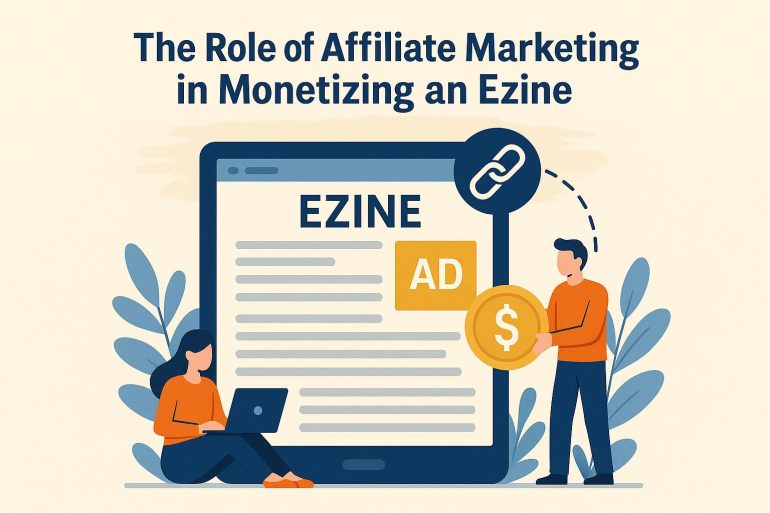The Concept of Affiliate Marketing in Ezine Monetization
Affiliate marketing is a strategic technique in digital marketing aimed at generating revenue by promoting third-party products or services. In the context of an ezine, which is an electronic magazine distributed via email or web, affiliate marketing serves as a powerful tool for monetization. An affiliate marketer earns a commission by directing traffic and promoting sales for companies through unique affiliate links.
Integrating Affiliate Marketing into Ezine Content
One of the primary advantages of incorporating affiliate marketing into an ezine is the seamless integration of affiliate links into editorial content. This allows for a more natural presentation of products or services that align with the interests of the ezine’s audience. By embedding these links within the articles or featuring them in dedicated sections, publishers can subtly introduce affiliate products without disrupting the flow of content.
The placement of affiliate links is a crucial aspect of this integration. Content creators must diligently work to ensure that the links do not appear forced or obtrusive. By doing so, they can maintain the reader’s engagement and trust. An effective strategy may involve weaving affiliate promotions into relevant content such as reviews, tutorials, or guides, all of which naturally align with the readership’s expectations and interests.
Moreover, interspersing these links within content that provides genuine value to the reader enhances the likelihood that audience members will engage with them. The aim is to heighten curiosity and provide solutions to problems that the readership faces, thereby increasing the probability of conversions.
Building Trust and Credibility
Effective affiliate marketing in an ezine undoubtedly depends on the trust and credibility established with the audience. Trust is built over time and requires consistent effort and authenticity from the publisher. It’s paramount for publishers to endorse products or services that are not only relevant but also genuinely beneficial to their readers. When an audience feels that an ezine has their best interests in mind, they are more inclined to explore the recommendations presented.
To maintain this trust, it’s essential to engage in transparent disclosure of any affiliate relationships. By clearly stating when content includes affiliate links, publishers create an open dialogue with their readership. Such honesty is appreciated by readers and helps cushion potential skepticism about biases. Additionally, establishing a rapport through personalized commentary and feedback can further reinforce trust and encourage reader interaction.
Selection of Affiliate Programs
Choosing the right affiliate programs is vital for the success of monetizing an ezine. Prioritizing collaborations with reputable affiliate networks or directly with brands offering quality products pertinent to the ezine’s niche can enhance both the content’s integrity and its monetization potential. Selecting programs with favorable commission rates, robust tracking capabilities, and efficient payment processes is equally important.
When evaluating potential affiliate programs, consider factors such as the program’s reputation, the relevance of its products to your ezine’s audience, the ease of use of its affiliate dashboard, and the resources it offers affiliates. Aligning these considerations with the audience’s preferences can lead to stronger engagement and, ultimately, higher conversion rates.
Furthermore, being selective about the programs you join allows you to provide more targeted and relevant content to your audience. By avoiding overwhelming them with excessive or irrelevant promotions, you can maintain the value-centric focus of your ezine.
Performance Analysis and Optimization
The efficacy of affiliate marketing efforts in an ezine requires ongoing analysis and optimization. Publishers should track metrics such as click-through rates (CTR), conversion rates, and overall revenue generated from affiliate links. These insights can reveal which strategies and product promotions resonate best with the audience.
Regularly reviewing and analyzing these key performance indicators (KPIs) empowers publishers to make data-driven decisions. Based on this data, adjustments can be made to strategies and content to enhance performance. Such adjustments might include testing new affiliate products, updating content layouts to better highlight affiliate links, or refining call-to-action (CTA) placements to boost engagement.
Another critical aspect is the periodic re-evaluation of the affiliate programs themselves. Certain programs might perform differently over time, or new opportunities may arise that are better suited to the evolving preferences of the readership. By staying attuned to these shifts, publishers can ensure that their monetization strategies remain optimized and aligned with both the industry trends and audience needs.
In conclusion, affiliate marketing presents a lucrative opportunity for ezine publishers seeking to monetize their content. When executed with authenticity and strategic foresight, it can result in sustainable financial benefits while providing valuable information and products to the audience. For detailed guidelines on how to implement these strategies, visit affiliatemarketing.com/guidelines.
The careful integration of affiliate marketing into an ezine ensures that both the publisher and the audience benefit symbiotically. Publishers gain financial rewards through strategic promotion, while the audience receives access to valuable products and services that cater to their interests and needs, thus fostering a mutually beneficial relationship that enhances the value of the ezine.

